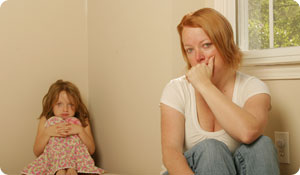
Life is full of ups and downs. Some of us handle the downs better than others. Now, researchers are investigating whether a difficult childhood could impact how adults react to stress.
Of course not all downs are created equally. Losing a job, for example, is a much bigger downer than feeling disappointed when a friend doesn't promptly return a call. But new research from the University of California (Los Angeles) suggests that significant adversity in childhood may make us more sensitive to stress (big stressors and little stressors) in adulthood.
Prior research examining this issue had revealed the link between significant adversity—the death of a loved one, for example—and first-time depression. But this research indicates that up to 60 percent of people with depression developed it following relatively minor misfortunes. Trauma in childhood could be one reason why.
According to the Centers for Disease Control and Prevention (CDC) depression is one of the most common mental health conditions in our country. The agency deems depression a major public health problem in the U.S. Although treatable, it affects 1 in 20 Americans 12 years and older and females are more prone to depression than men. Because of its prevalence and debilitating nature, research efforts are ongoing in the search for information that can shed new light on the problem and help sufferers cope.
George Slavich, an assistant professor at the UCLA Cousins Center for Psychoneuroimmunology, along with his colleagues studied 100 depressed individuals-26 men and 74 women. The subjects of the study were interviewed extensively about their experiences with early adversity, clinical depression, and recent life stress. The results indicated that people who lost a parent or had been separated from a parent for a least one year before the age of 18 as well as individuals who had experienced multiple episodes of depression during their lifetime, became depressed following significantly lower levels of recent life stress.
In a UCLA press release Slavich said individuals with those predispositions (loss of loved one, separation from parent and history of depression) may be selectively sensitized to stressors involving personal loss. "Our study suggests for the first time that these associations may be unique to stressors involving interpersonal loss," Slavich said.
Some experts think people who experience early adversity or depression develop negative beliefs about themselves or the world. When faced with situations that are stressful to them, the pessimism is activated. Another explanation is that having emotionally challenging experiences in childhood (before the brain is fully developed) may influence the biology involved in depression, perhaps by lowering the threshold at which depression get triggered.
Thoughts and stress are closely connected, according to Slavich. By way of explanation, he poses the following question: "When your best friend doesn't call back, do you think she is angry at you or do you think it just slipped her mind?"
There is no single cause for depression. Many factors play a role: genetics, environment, life events, medical conditions, and the way you react to experiences in your life. Death is always upsetting but can sometimes go beyond normal grief and lead to depression. Other difficult life events such as separation, divorce, and remarriage can trigger depression.
The difference between depression and normal grief is that depression lingers-lasting weeks, months or longer. Depression interferes with a person's ability to participate in normal activities. Regular sadness usually lifts with a little TLC.
Sources:
UCLA
www.ucla.edu
National Institute of Mental Health
www.nimh.nih.gov
Nemours
www.kidshealth.org
Centers for Disease Control and Prevention
www.CDC.gov





